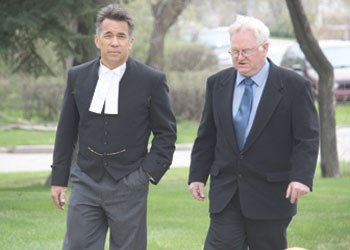The closing arguments have been delivered and the jury was given their final instructions in the Kim Walker trial. Walker is accused of second degree murder in the death of James Hayward.
Defense council Balfour Der focused on getting the jury to imagine what they would do in Walker's situation. During a closing argument which caused Walker's family to break down in tears, Der emphasized the situation Walker was in at the time.
He says Walker was a loving and devoted father, and he had a daughter who was addicted to drugs and becoming increasingly unhealthy. Responding to criticism that there were questions Walker didn't ask when trying to help his daughter, Der said he took answers at face value, and that he would do anything he could if he knew it was possible. He also emphasized that Walker was having difficulty getting the police to act on accusations that Hayward was in possession of, and dealing drugs.
In response to Walker bringing a gun with him to Hayward's house, Der emphasized that he was no physical match, and argued the gun was there for protection, rather than brought with an intent to kill.
"If he just wants to kill this man, why not take the shotgun?" Der questioned.
The series of events, Der suggested, were indicative of a man who panicked rather than a man intending to kill another. He noted that Walker was familiar with firearms but the accuracy was poor, which he suggested indicated panic.
He also suggested that the actions after the incident indicate that Walker was not expecting the events to unfold as they did. He noted that Walker called the police and waited for their arrival.
Der argued that in that case, Walker should be found to have been acting in self defense. He suggested that Walker believed he was about to be assaulted, something which is covered under section 34 of the criminal code. He also noted that under section 37, self defense also applies to defending another person, in this case his daughter.
When it comes to the large memory gaps in Walker's testimony, Der emphasized that Walker was under pressure, charged with a serious crime. He also argued he could have easily made up a version of events that aligned with previous testimony, and that the lack of memory is not helpful to the case.
He referred to the testimony of Dr. Robin Menzies, who testified that Walker was in a dissociative state at the time, something which can happen when under extreme emotional stress.
Der says it was important to emphasize Walker's position to the jury because their different perspectives might mean the jury would do something else in that situation.
"The jury had to understand we're dealing with a man who is ill equipped to handle this type of situation, and he's no physical match for Hayward who is a vicious, dangerous man. It's entirely reasonable that Mr. Walker is going to try to get his daughter out of harm's way," Der says.
The lawyer says he wasn't trying to play on emotions, but that he wanted the jury to understand his perspective. He notes that some of the jurors might have been able to handle Hayward, but Walker could not.
Crown prosecutor Robin Ritter reminded the jury that they must not be under the influence of public opinion and that they did not have the luxury of sympathy.
Ritter first focused on the actions taken during the time before the incident took place. He noted that the act of preparing the gun and going to the home indicated that the defendant had some idea of what was going to happen.
He also noted that there were other steps a reasonable person could take in the situation. Ritter said that Walker could have left the residence when Hayward demanded. He also noted that a warning shot could have been fired. He said that witnesses reported shots were fired continuously for 20 seconds, which he suggested went beyond protection.
Ritter also noted the three bullets found in the floor. He suggested that there was no reason for the bullets to be fired downwards, unless the defendant was firing at the body.
Also brought up was Hayward's rights. Ritter said that he was justified in demanding someone leave his house, and that Hayward was unarmed at the time. Ritter said he was a defenseless man shot in his own home.
In the events leading up to the incident, Ritter suggested that Walker could have avoided the problems by asking more questions of the services available for drug treatment.
"Is it about her drug problem, or Mr. Walker being in charge?" Ritter asked.
Ritter also questioned Menzies' report on Walker's state at the time. He said Menzies only spent a short time with Walker, the report was five years after the event, and the initial report had no diagnosis. He suggested that Menzies liked Walker, and his report was not impartial.
Ritter says that his goal was to remind the jury of the facts of the case. He says that between the deliberate steps taken before the incident and the rapid fire of the gun, including shots fired towards the ground, is a clear indication of intent.
Justice Ellen Gunn delivered the charge to the jury on Tuesday. The charge, which took over two and a half hours, went in detail about the charges, the possible verdicts, and the things the jury must consider in making their decsion.




